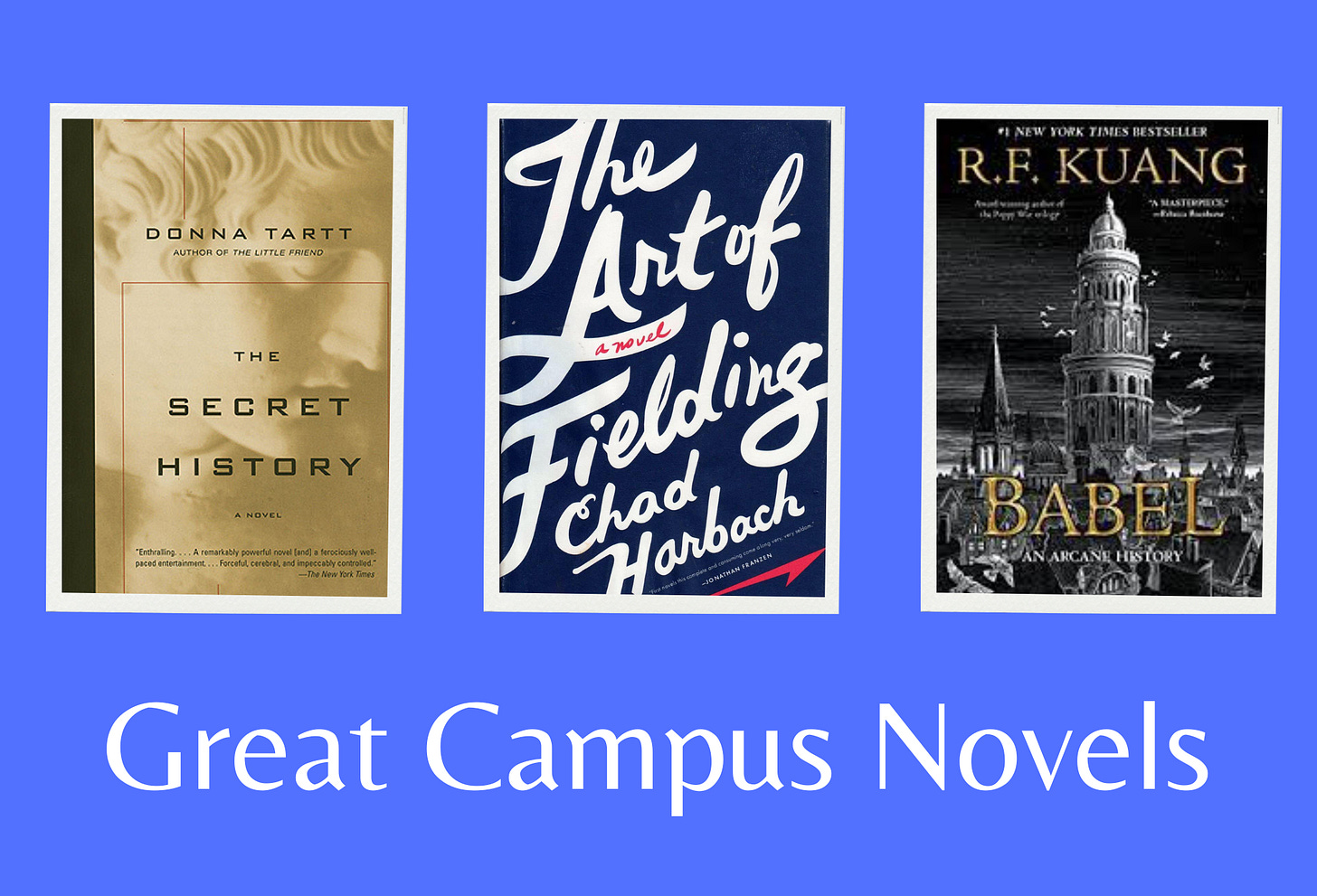Hello readers,
How was your long weekend? If it was like ours, the kids had a couple days off the school while the adults tried to figure out ways to entertain them while still working. Thankfully the weather complied and we shooed ‘em all outside for a few hours each day.
In today’s newsletter, I have some thoughts on forgetting what you read, a mini list of great campus novels, and a few fun links.
Something I’m Thinking About: It’s Okay to Forget What You Read
I get a lot of questions about how I remember what I read. And you’ll find innumerable articles online slinging ideas and apps about how to better retain what you read. It’s a worthy quest, but I also think it’s a little bit misguided.
After years of pondering that question myself, I no longer feel the need to remember the specifics of everything I read.
When you view books as a form of mental, emotional, and spiritual nourishment, you’re freed from the necessity of being able to recall every plot twist and turn of phrase.
It’s much like eating three square meals a day. You don’t remember every meal you eat, but you need to eat regularly or you’ll whither away. You do remember the special meals, though — celebrations and special moments, hidden gem restaurants, nostalgic comfort foods, etc.
If I go too long without reading, I feel antsy . . . hungry to crack open the spine of a delicious book. I don’t remember every story, and over time I end up forgetting plot points and entire characters of even my favorite books. But I do remember the special ones — whether it’s the beauty of the story itself (This Is How It Always Is) or tied to big moments in life (When Breath Becomes Air, which I read after all three of my kids were born).
Every time I read, regardless of if I end up remembering the details or not, it nourishes my inner being.
Treat reading as the daily meal your soul needs to function at its peak.
The Mini List: Great Campus Novels
I recently finished Rebecca Makkai’s spectacular new I Have Some Questions for You. It’s boarding school setting had me reminiscing about great campus novels, of which there are many. Here are just a few that have stuck with me.
The Secret History by Donna Tartt — A memorable, mysterious novel that’s chock-full of unlikable characters. Her writing is second-to-none.
The Art of Fielding by Chad Harbach — A star athlete gets the yips. Though baseball provides the thrust of the story, it’s far more about the characters.
Babel by R. F. Kuang — A fantastical, Dickensian journey through 19th century Oxford, with a bit of magic and violence thrown in. Hard to put down.
Miscellany
💡 I was just telling the 7-year-old where my best ideas invariably come from: reading and walking. This article backs up the idea that your zoned-out, distractible state of mind is best for brainstorming.
🧩 My daily word game lineup has lately come courtesy of the NYT Games app. I play the mini crossword (and text my time to my pal Jonny), Spelling Bee (my goal is “Amazing”), and Wordle. I like having it all in one spot.
🌹 “A Fake Death in Romancelandia” — This article is just as juicy and wild as you’d expect. (NYT gift link, meaning you don’t need an account to read it.)
📺 Between episodes of Abbott Elementary, we’ve been enjoying medical drama New Amsterdam (Netflix). It’s not the most sophisticated thing you’ll find, but it’s great for weeknights while crafting (Jane) or doing some newsletter writing (me).
🍪 I made these world peace cookies over the weekend and they definitely live up to the hype. This chocolatey shortbread treat may, in fact, be capable of bringing about world peace.
Thanks so much for the time and attention — I deeply appreciate it.
-Jeremy






Thanks for the Links! A question I've wanted to ask seems appropriate, given today's newsletter. You've done several excellent articles about how to read more, and today on giving yourself grace for not remembering all the details. I'm wondering how, amidst your chock-full life, you find time to write, edit, and publish. You've just hinted at writing in the evening while casually watching TV. I'd love to hear some of the other strategies you've developed over the years.
Thanks for the "Campus Novels" list! A favorite of mine in that category is "Straight Man" by Richard Russo - highly recommended if you haven't read it.